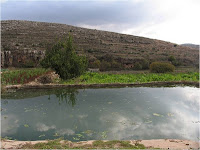An emerging coalition in Israel dramatically illustrates how common environmental concerns can create unexpected partnerships across difficult political barriers. Through programs initiated by Friends of the Earth Middle East, the Israeli and Palestinian residents of Wadi Fukin and Tzur Hassadah (see inset map) have joined together to oppose the construction of a planned security barrier between their two communities.
View Good Water Neighbors in a larger mapThe barrier, an element of the Israeli Green Line, threatens to disrupt
karstic springs that support traditional agriculture in the Fukin valley. One third of the Israeli residents of Tzur Hadassah petitioned to halt construction, reports
Israeli newspaper Haaretz.
“The Israeli community understood that instead of providing them with security, the fence would harm the springs and lands of the village, and will rob the Palestinian farmers of their livelihood and arouse hatred toward their Israeli neighbors,” Friends of the Earth Middle East (FoEME) Director Gidon Bromberg told Haaretz.
On February 24th, Israelis and Palestinians from both communities met to organize their response to the construction of the separation barrier, including preparing to petition to the Israeli High Court of Justice.
“The case of Wadi Fukin is special, because it is the first time that the resistance of the residents is not based on human rights allegations. Objections here are from an environmental organization,” FoEME attorney Michael Sfard told NRG news.
 Since 2001, FoEME’s Good Water Neighbors project has helped divided communities come together over shared natural resources. By collaborating with community members to improve their water situation, the organization encourages sustainable water management through information sharing, dialogue, and cooperative ventures. While the majority of the communities share common surface water sources, including the Jordan and Zomar rivers, some, as with Wadi Fukin and Tzur Hassadah, rely on common underground aquifers.
Since 2001, FoEME’s Good Water Neighbors project has helped divided communities come together over shared natural resources. By collaborating with community members to improve their water situation, the organization encourages sustainable water management through information sharing, dialogue, and cooperative ventures. While the majority of the communities share common surface water sources, including the Jordan and Zomar rivers, some, as with Wadi Fukin and Tzur Hassadah, rely on common underground aquifers.
This “natural interdependence,” says Bromberg, helps to create trust and solve problems facing both communities.
Photo: Courtesy Friends of the Earth Middle East  Since 2001, FoEME’s Good Water Neighbors project has helped divided communities come together over shared natural resources. By collaborating with community members to improve their water situation, the organization encourages sustainable water management through information sharing, dialogue, and cooperative ventures. While the majority of the communities share common surface water sources, including the Jordan and Zomar rivers, some, as with Wadi Fukin and Tzur Hassadah, rely on common underground aquifers.
Since 2001, FoEME’s Good Water Neighbors project has helped divided communities come together over shared natural resources. By collaborating with community members to improve their water situation, the organization encourages sustainable water management through information sharing, dialogue, and cooperative ventures. While the majority of the communities share common surface water sources, including the Jordan and Zomar rivers, some, as with Wadi Fukin and Tzur Hassadah, rely on common underground aquifers.  A Publication of the Stimson Center.
A Publication of the Stimson Center.

 Since 2001, FoEME’s
Since 2001, FoEME’s 

